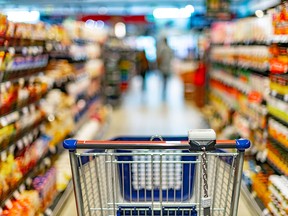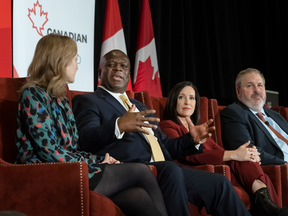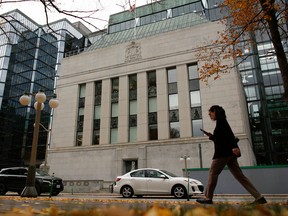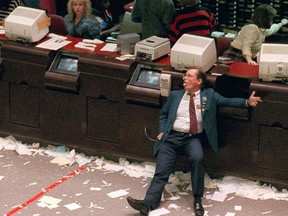Meeting today to work on plan to address food inflation crisis
Article content
The heads of the biggest grocery chains in Canada are expected in Ottawa on Sept. 18 for a hastily arranged meeting about food prices with industry minister François-Philippe Champagne.
Invitations for the meeting went out late last week, just as Prime Minister Justin Trudeau gave a speech threatening the big grocers with new tax measures if they couldn’t work with Champagne to come up with a plan to address the country’s food inflation crisis.
Advertisement 2
Article content
Article content
“Our biggest grocery stores are making record profits while Canadians are struggling to put food on the table,” Trudeau said in a speech on Sept. 14 at the end of the Liberal Party caucus retreat in London, Ont.
This is the latest public-relations crisis in a long and bruising year for the big grocers. For months, they’ve been trying to explain to the public that their profits are a result of efficiencies and other factors, not food inflation. Their CEOs appeared before parliamentary committee hearings earlier this year to explain themselves. The Competition Bureau released a lengthy report on the industry this summer. And just when it looked like the grocers were finally getting up off the mat, the prime minister and a senior cabinet minister would like a word.
Who’s going?
Champagne wants to see the CEOs of the country’s top five food retailers, which control roughly 80 per cent of food sales: Loblaw Cos. Ltd., Sobeys’ parent Empire Co. Ltd., Metro Inc., Wal-Mart Canada Corp. and Costco Wholesale Canada Ltd.
“It’s not an invitation,” he said in a speech to the Liberal caucus last week. “We told them to be in Ottawa next week. That’s pretty clear.”
Advertisement 3
Article content
The minister’s office instructed each company to only send its chief executive or Canadian president — lawyers and government relations staff are not allowed, Champagne’s spokesperson Audrey Champoux said. On the government side, Champagne and his deputy minister will be there, and Minister of Finance Chrystia Freeland will be there for a portion of the meeting. Dalhousie University’s Sylvain Charlebois, a researcher and frequent media commentator, will also attend.
The Retail Council of Canada, a lobby group that represents the grocers, said the meeting will be ineffectual since the government didn’t invite food manufacturers.
“Any conversation that doesn’t include the vendors, whose costs make up more than 70 per cent of the price to customers, will not provide meaningful outcomes,” RCC said in a statement last week.
The executives appear to be going anyway, according to statements from the companies. Loblaw president Galen Weston, the industry’s most high-profile leader, will be there, a spokesperson confirmed. So will Metro Inc. chief executive Eric La Flèche, Wal-Mart Canada chief executive Gonzalo Gebara and Empire chief executive Medline along with his general counsel, Doug Nathanson. CostCo didn’t respond to a request for comment.
Article content
Advertisement 4
Article content
But that five of the most powerful people in grocery are sitting down in a closed-door meeting to talk about prices shouldn’t pose any concerns, said Jennifer Quaid, an associate professor at the University of Ottawa who specializes in competition law.
“This is not them getting together on their own,” she said. “There’s a referee, if you will, in the form of the minister of industry — who, of all people, should not be encouraging cartel behaviour.”
Champoux, Champagne’s spokesperson, said the meeting is just the first of many between the minister and executives from across the food supply chain.
“We realize that the issue doesn’t solely lie on the backs of grocers,” she said.
Is this going to change anything?
Champagne seems to think it will.
“We want to see meaningful action,” he told the Liberal caucus. “If they fail to act, there will be consequences.”
Trudeau warned the big grocers could face “tax measures” if the process with the CEOs and Champagne doesn’t come up with a solution by Thanksgiving.
But Opposition leader Pierre Poilievre called the meeting a photo op.
Advertisement 5
Article content
“If he admits now that grocery prices and grocery profits are too high, why hasn’t he done anything about it? He’s the prime minister,” the Conservative leader said in a news conference. “This is more political theatre.”
The grocers have argued that food inflation stems from a complex mix of geopolitical factors beyond their control, including the war in Ukraine, elevated fuel prices and global supply chain problems.
“Grocers are always prepared to have good faith discussions with government,” RCC said in its statement last week. “But we are not going to get anywhere with discussions that time and time again fail to look below the surface as to the true cause of rising grocery prices.”
Also last week, Empire’s Michael Medline said the company’s internal gauge on inflation dropped to its lowest level in 17 months. Statistics Canada said grocery prices were up 8.5 per cent in July compared to the previous year — the lowest inflation rate since February 2022.
“As I’ve said consistently over the past 18 months: We don’t like inflation,” Medline told Empire’s annual general meeting on Sept. 14 “We don’t like the choices it forces our customers to make. And we are not benefitting from it.”
Advertisement 6
Article content
Haven’t we been here before?
This is the second time this year that the grocery CEOs have been called to Parliament Hill. In March, the parliamentary agriculture committee summoned the grocers to answer allegations that they had been using the worst food inflation in four decades to pad their profits.
“Our profit doesn’t go to me,” Weston said in one of several exchanges with NDP Leader Jagmeet Singh during the hearing. “It goes back into this country.”
During the hearings, the committee zeroed in on the companies’ gross margins since the metric is viewed as the best test of whether a grocery chain is jacking up prices more than necessary. Gross margin measures how much revenue is left over after subtracting the cost of goods. So, the logic goes, if a grocer is simply passing on cost increases from suppliers to customers, its gross margin shouldn’t get bigger.
But the grocers said their businesses were far too diversified and complex to use gross margin as any sort of smoking gun.
For example, Loblaw and Metro said their margin improvements have come from their pharmacy divisions. As pandemic restrictions lifted, people returned to social gatherings and started buying high-margin products such as cosmetics, fragrances and cold medications. Meanwhile, food margins have stayed flat since inflation started to ramp up in 2021, one Loblaw executive told the committee.
Advertisement 7
Article content
But the companies’ public financial statements didn’t provide enough detail to back up those explanations, as Bloc Quebecois MP Yves Perron pointed out during one of the March hearings.
“The financial statements are quite impenetrable,” he said. “They tell us that, for example, they’ve made more profit in the pharmacy side, but not so much in the food side, and we have no way of actually verifying.”
In August, however, a Bank of Canada report splashed some cold water on the discussion. The research paper, which looked at the broader economy beyond just food retail, said “markup growth accounted for less than one-tenth of inflation in 2021.” In 2022, growth in markups was near zero or negative.
“Counter to what we would expect if firms were using their market power to raise prices, increases in the markups of Canadian firms do not coincide with the high inflation in 2021 and 2022,” the report said.
Enter the Competition Bureau
The Bank of Canada report also noted there are limits to what you can glean from public financial statements alone. So, the authors calculated markup growth using data from Statistics Canada’s Quarterly Survey of Financial Statements.
Advertisement 8
Article content
The Competition Bureau, a federal law enforcement agency, tried to go further. In a report earlier this summer, the bureau said it asked grocers to hand over private data, but didn’t get everything it was looking for.
“The level of cooperation varied significantly, and was not fulsome,” the bureau said in a report. “In many instances, the bureau was not able to obtain complete and precise financial data, despite its repeated requests.”
At the time, the bureau didn’t have the power to compel companies to hand over information. But that may change. Last week, as part of his announcement about taking on the grocers, Trudeau said the government will bring legislative changes that will give the bureau power to compel information when conducting market studies.
-

Loblaw’s Galen Weston faces his critics in Ottawa
-

MPs escalate food inflation fight with grocers
-

Grocery CEOs snub Ottawa profiteering inquiry
Competition commissioner Matthew Boswell, who has been calling for the change, said it’s possible the bureau will reopen its grocery industry study if the new powers come into effect.
Advertisement 9
Article content
“It’s great news, a great announcement. We’ll see how long it takes to get through Parliament and what it looks like when it’s drafted,” he said on Sept. 15. “Perhaps we’ll go back to grocery. I don’t know. There’s a lot of intervening acts that have to take place for us to get there.”
In the bureau’s initial report, it found some problems with the grocers’ margins, particularly that their ability to make slight increases to their gross margins is a sign that “there is room for more competition” in the retail food industry.
“We saw Canada’s largest grocers’ food gross margins generally increase by a modest yet meaningful amount over the last five years,” the report said. “The fact that Canada’s largest grocers have generally been able to increase these margins — however modestly — is a sign that there is room for more competition in Canada’s grocery industry.”
• Email: jedmiston@nationalpost.com
Bookmark our website and support our journalism: Don’t miss the business news you need to know — add financialpost.com to your bookmarks and sign up for our newsletters here.
Article content
Grocery CEOs summoned to answer Trudeau tax threat
2023-09-18 14:33:03






Comments
Postmedia is committed to maintaining a lively but civil forum for discussion and encourage all readers to share their views on our articles. Comments may take up to an hour for moderation before appearing on the site. We ask you to keep your comments relevant and respectful. We have enabled email notifications—you will now receive an email if you receive a reply to your comment, there is an update to a comment thread you follow or if a user you follow comments. Visit our Community Guidelines for more information and details on how to adjust your email settings.
Join the Conversation